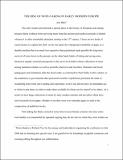| dc.contributor.author | Blair, Ann M. | |
| dc.date.accessioned | 2011-03-28T18:16:42Z | |
| dc.date.issued | 2011-03-28 | |
| dc.identifier.citation | Blair, Ann. 2010. The rise of note-taking in Early Modern Europe. Intellectual History Review 20(3): 303-16. | en_US |
| dc.identifier.issn | 1749-6977 | en_US |
| dc.identifier.uri | http://nrs.harvard.edu/urn-3:HUL.InstRepos:4774908 | |
| dc.description.abstract | The history of note-taking has only begun to be written. On the one hand, the basic functions of selecting, summarizing, storing and sorting information garnered from reading, listening, observing and thinking can be identified in most literate contexts in some form or other. On the other hand, Renaissance humanists emphasized with unprecedented success the virtues of stockpiling notes on large scales and for the long term, thanks to the availability of paper and a new abundance of books, but also to their ability to transmit their own keen motivation to avoid any future loss of learning. We continue to share many early modern ideals for insuring the collection and retrievability of information and have built on early modern practices that facilitate the accumulation and the organization of information, including collaborative work and the use of rearrangeable slips. | en_US |
| dc.description.sponsorship | History | en_US |
| dc.language.iso | en_US | en_US |
| dc.publisher | Taylor and Francis | en_US |
| dc.relation.isversionof | doi:10.1080/17496977.2010.492611 | en_US |
| dash.license | OAP | |
| dc.title | The Rise of Note-Taking in Early Modern Europe | en_US |
| dc.type | Journal Article | en_US |
| dc.description.version | Accepted Manuscript | en_US |
| dc.relation.journal | Intellectual History Review | en_US |
| dash.depositing.author | Blair, Ann M. | |
| dc.date.available | 2011-03-28T18:16:42Z | |
| dc.identifier.doi | 10.1080/17496977.2010.492611 | * |
| dash.contributor.affiliated | Blair, Ann | |


